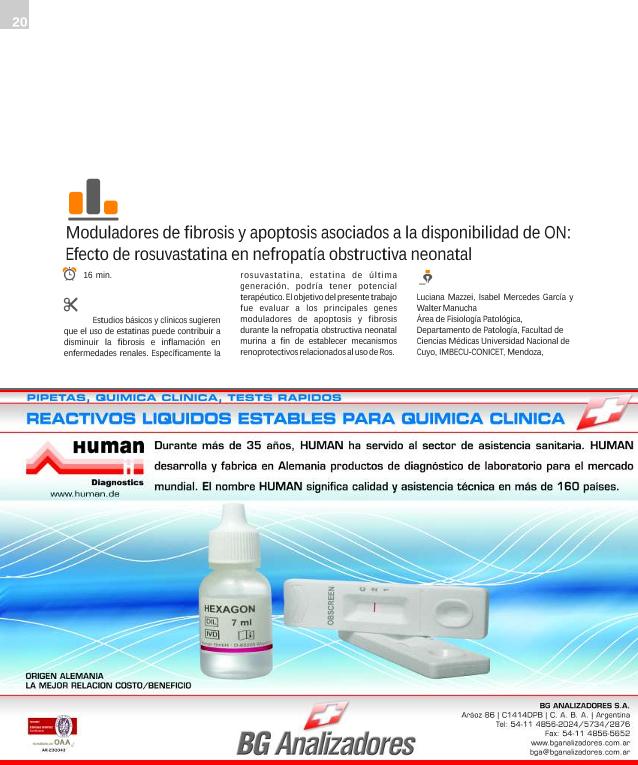Artículo
Moduladores de fibrosis y apoptosis asociados a la disponibilidad de on: Efecto de rosuvastanina en nefropatia obstructiva neonatal
Fecha de publicación:
06/2010
Editorial:
Grupo Bio SRL
Revista:
Revista Bioanálisis
ISSN:
1669-8703
Idioma:
Español
Tipo de recurso:
Artículo publicado
Clasificación temática:
Resumen
Wilms tumor gene 1 (wt-1), a key regulator of mesenchymal-epithelial transformation, is downregulated during congenital obstructive nephropathy, leading to apoptosis. There is a functional interaction between WT-1 and inducible nitric oxide synthase (iNOS). In this regard, we reported that after neonatal unilateral ureteral obstruction, rosuvastatin prevents apoptosis through an increase in nitric oxide bioavailability, which in turn is linked to higher Hsp70 expression. Hence, the goal of this study was to determine whether a nitric oxide/Hsp70 interaction is involved in changes in WT-1 mRNA expression after ureteral obstruction. Neonatal rats submitted to experimental ureteral obstruction were treated with either vehicle or rosuvastatin for 14 days. Decreased nitric oxide and iNOS/Hsp70 expression associated with WT-1 low expression was shown in obstructed kidneys. Apoptosis was induced and it was associated with an increased Bax/BcL2 ratio. Conversely, iNOS/Hsp70 upregulation and an increased WT-1 mRNA expression, without an apoptotic response, were observed in the cortex of obstructed kidneys of rosuvastatin-treated rats. Nitric oxide also modulated Hsp70 and WT-1 mRNA expression in MDCK cells. Finally, in vivo experiments with nitric oxide modulators support our hypothesis that WT-1 mRNA expression is associated with nitric oxide level. Results suggest that rosuvastatin may modulate WT-1 mRNA expression through renal nitric oxide bioavailability, preventing neonatal obstruction-induced apoptosis associated with Hsp70 interaction.
Palabras clave:
Obstructive Nephropathy
,
Apoptosis
,
Statins
,
Kidney Development
Archivos asociados
Licencia
Identificadores
Colecciones
Articulos(IMBECU)
Articulos de INST. DE MEDICINA Y BIO. EXP. DE CUYO
Articulos de INST. DE MEDICINA Y BIO. EXP. DE CUYO
Citación
Mazzei, Luciana Jorgelina; García, Isabel Mercedes; Manucha, Walter Ariel Fernando; Moduladores de fibrosis y apoptosis asociados a la disponibilidad de on: Efecto de rosuvastanina en nefropatia obstructiva neonatal; Grupo Bio SRL; Revista Bioanálisis; 6; 6-2010; 20-26
Compartir




